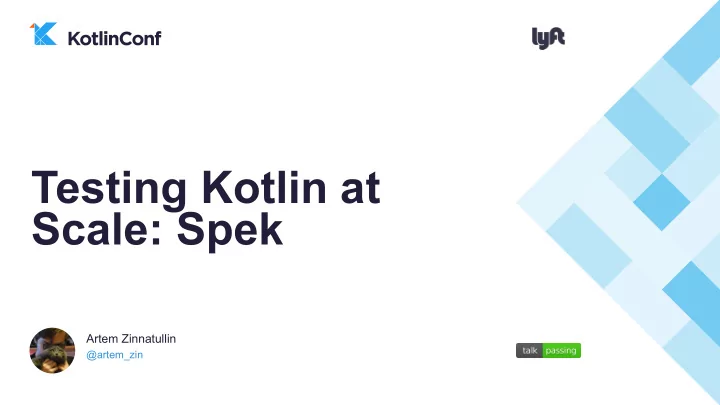

context("2 + 4") { }x describe(“2 + 4") { }x Spek: Basic API
context("2 + 4") { }x describe("2 + 4") { }x given(“2 + 4") { }x Spek: Basic API
describe("2 + 4") { }x context("2 + 4") { }x given("2 + 4") { }x group(“2 + 4") Spek: Basic API
group("") ~= Test class in JUnit Spek: Basic API
group("") ~= Test class in JUnit You can nest groups naturally Spek: Basic API
it("equals 6") { assertThat (result).isEqualTo(6) } Spek: Basic API
it("equals 6") { assertThat (result).isEqualTo(6) } @Test fun `2 + 4 = 6`() { val result = calculator.add(2, 4) assertEquals(6, result) } Spek: Basic API
it("equals 6") { assertThat (result).isEqualTo(6) } @Test fun `2 + 4 = 6`() { val result = calculator.add(2, 4) assertEquals(6, result) } Spek: Basic API
it("equals 6") { assertThat (result).isEqualTo(6) } @Test fun `2 + 4 = 6`() { val result = calculator.add(2, 4) assertEquals(6, result) } Spek: Basic API
it("equals 6") { assertThat (result).isEqualTo(6) } @Test fun `2 + 4 = 6`() { val result = calculator.add(2, 4) assertEquals(6, result) } Spek: Basic API
it("") = @Test in JUnit Spek: Basic API
it("") = @Test in JUnit You can have as many `it` in a `group` as needed Spek: Basic API
Groups and Tests create natural structure that scales very well Spek: Basic API
val calculator by memoized { Calculator() } Spek: Basic API
You avoid state sharing betwen tests with `memoized` Spek: Basic API
Let’s rewrite real JUnit test with Spek
@Test fun `remove access token should stop logged in scope and start logged out scope`() { accessTokenRepository.removeAccessToken() val scopeChange1 = scopeManager.scopeChanges[0] assertThat(scopeChange1.scope).isEqualTo(PassengerScopes. LOGGED_IN ) assertThat(scopeChange1.started).isFalse() val scopeChange2 = scopeManager.scopeChanges[1] assertThat(scopeChange2.scope).isEqualTo(PassengerScopes. LOGGED_OUT ) assertThat(scopeChange2.started).isTrue() } 4 checks 🙀 JUnit 4: “What does this test test” Problem
@Test fun `remove access token should stop logged in scope and start logged out scope`() { accessTokenRepository.removeAccessToken() val scopeChange1 = scopeManager.scopeChanges[0] assertThat(scopeChange1.scope).isEqualTo(PassengerScopes. LOGGED_IN ) assertThat(scopeChange1.started).isFalse() val scopeChange2 = scopeManager.scopeChanges[1] assertThat(scopeChange2.scope).isEqualTo(PassengerScopes. LOGGED_OUT ) assertThat(scopeChange2.started).isTrue() } JUnit 4: “What does this test test” Problem
context("remove access token") { } Let’s rewrite real JUnit test with Spek
context("remove access token") { beforeEachTest { accessTokenRepository.removeAccessToken() } } Let’s rewrite real JUnit test with Spek
context("remove access token") { beforeEachTest { accessTokenRepository.removeAccessToken() } } Let’s rewrite real JUnit test with Spek
@Test fun `remove access token should stop logged in scope and start logged out scope`() { accessTokenRepository.removeAccessToken() val scopeChange1 = scopeManager.scopeChanges[0] assertThat(scopeChange1.scope).isEqualTo(PassengerScopes. LOGGED_IN ) assertThat(scopeChange1.started).isFalse() val scopeChange2 = scopeManager.scopeChanges[1] assertThat(scopeChange2.scope).isEqualTo(PassengerScopes. LOGGED_OUT ) assertThat(scopeChange2.started).isTrue() } JUnit 4: “What does this test test” Problem
@Test fun `remove access token should stop logged in scope and start logged out scope`() { accessTokenRepository.removeAccessToken() val scopeChange1 = scopeManager.scopeChanges[0] assertThat(scopeChange1.scope).isEqualTo(PassengerScopes. LOGGED_IN ) assertThat(scopeChange1.started).isFalse() val scopeChange2 = scopeManager.scopeChanges[1] assertThat(scopeChange2.scope).isEqualTo(PassengerScopes. LOGGED_OUT ) assertThat(scopeChange2.started).isTrue() } JUnit 4: “What does this test test” Problem
describe("first scope change") { } Let’s rewrite real JUnit test with Spek
describe("first scope change") { val firstScopeChange by memoized { scopeManager.scopeChanges[0] } } Let’s rewrite real JUnit test with Spek
@Test fun `remove access token should stop logged in scope and start logged out scope`() { accessTokenRepository.removeAccessToken() val scopeChange1 = scopeManager.scopeChanges[0] assertThat(scopeChange1.scope).isEqualTo(PassengerScopes. LOGGED_IN ) assertThat(scopeChange1.started).isFalse() val scopeChange2 = scopeManager.scopeChanges[1] assertThat(scopeChange2.scope).isEqualTo(PassengerScopes. LOGGED_OUT ) assertThat(scopeChange2.started).isTrue() } JUnit 4: “What does this test test” Problem
describe("first scope change") { val firstScopeChange by memoized { scopeManager.scopeChanges[0] } it("is 'logged in' scope") { assertThat(firstScopeChange.scope).isEqualTo( LOGGED_IN ) } it("is not started") { assertThat(firstScopeChange.started).isFalse() } } Let’s rewrite real JUnit test with Spek
class JUnitTest { private var scopeManager = MockScopeManager() private val accessTokenRepository = AccessTokenRepository( RuntimeEnvironment. application , scopeManager ) lateinit var scopeChange1: MockScopeManager.ScopeChange lateinit var scopeChange2: MockScopeManager.ScopeChange @Before fun `remove access token`() { accessTokenRepository.removeAccessToken() scopeChange1 = scopeManager.scopeChanges[0] scopeChange2 = scopeManager.scopeChanges[1] } @Test JUnit is not structured, it’s flat fun `first scope change is 'logged in' scope`() { assertThat(scopeChange1.scope).isEqualTo( LOGGED_IN ) } @Test fun `first scope change is not started`() { assertThat(scopeChange1.started).isFalse() } @Test fun `second scope change is 'logged out' scope`() { assertThat(scopeChange2.scope).isEqualTo( LOGGED_OUT ) } @Test fun `first scope change is started`() { assertThat(scopeChange2.started).isTrue() } } Let’s rewrite real JUnit test with Spek
class Spec : Spek( { val scopeManager by memoized { MockScopeManager() } val accessTokenRepository by memoized { AccessTokenRepository(RuntimeEnvironment. application , scopeManager) } context("remove access token") { beforeEachTest { accessTokenRepository.removeAccessToken() } describe("first scope change") { val firstScopeChange by memoized { scopeManager.scopeChanges[0] } it("is 'logged in' scope") { assertThat(firstScopeChange.scope).isEqualTo( LOGGED_IN ) } Spek has structure it("is not started") { assertThat(firstScopeChange.started).isFalse() } } describe("second scope change") { val secondScopeChange by memoized { scopeManager.scopeChanges[1] } it("is 'logged out' scope") { assertThat(secondScopeChange.scope).isEqualTo( LOGGED_OUT ) } it("is started") { assertThat(secondScopeChange.started).isTrue() } } } } ) Let’s rewrite real JUnit test with Spek
Recommend
More recommend